CIA Expresses US Commitment To Back Free Flow Of Information In Iran
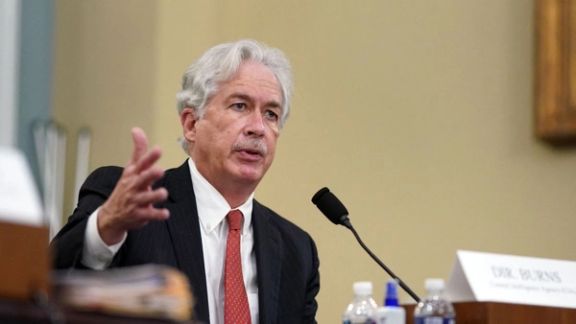
CIA Director Bill Burns has reiterated US commitment to support the “free flow of information" in Iran following the shutdown of internet access amid the ongoing uprising.

CIA Director Bill Burns has reiterated US commitment to support the “free flow of information" in Iran following the shutdown of internet access amid the ongoing uprising.
Burns told CBS on Tuesday that the new wave of rallies in Iran are not isolated protests, tacitly agreeing with the interviewer that this can be a beginning of a revolution in the country.
“I don’t think they are isolated protests, and what is striking – at least to me and our analysts – is the sweep of those protests right now,” he said, adding that “these are incredibly brave people and many incredibly brave young women and they are fed up in a lot of ways.”
Burns said, “They are willing to take the risk of getting out and demonstrate because they are fed up with the economic decay, the corruption, with social restrictions especially that Iranian women face, and the political repression as well.”
He called the Iranian regime an “autocratic system,” noting that they are very good at repressing people and “they are quite ruthless now in putting down those kinds of protests as well.”
Others are helping Iranians get easier access to information since the authorities have increased their restrictions. The US Treasury Department has given the greenlight to SpaceX CEO Elon Musk to activate satellite Internet service Starlink for Iranians and Google has just launched a VPN service for Iranians, but using such methods are not simple enough for ordinary people and still not many have managed to access the Internet via them.
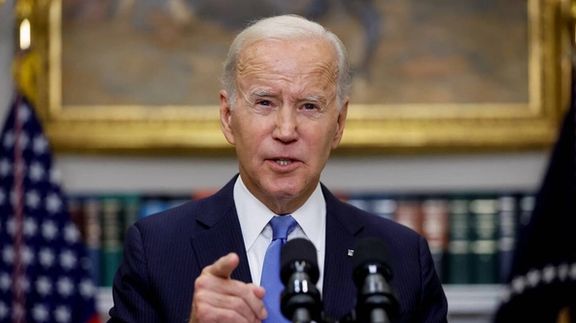
US President Joe Biden says the United States stands with Iranian women and Iranian citizens who are inspiring the world with their bravery.
In a tweet on Tuesday, he said that “This week, we will impose further costs on perpetrators of violence against peaceful protestors," adding that “We'll continue to support the rights of Iranians to protest freely.”
Biden also issued a statement on Monday saying he remains “gravely concerned about reports of the intensifying violent crackdown on peaceful protestors in Iran, including students and women, who are demanding their equal rights and basic human dignity.”
Iran’s government and media remained largely silent on Tuesday over Biden’s condemnation of the violent crackdown against protesters in Iran.
Earlier on Monday, Iran’s Supreme leader Ali Khamenei had already blamed more than two weeks of street protests on the United States, which he again labeled as “the enemy”.
French Foreign Minister Catherine Colonna said Tuesday that the European Union is looking to impose asset freezes and travel bans on a number of Iranian officials involved in the crackdown on protests, adding that "France's action at heart of EU ... (is) to target those responsible for the crackdown by holding them responsible for their acts." Diplomats say the measures are expected to be rubber-stamped at an EU foreign ministers meeting on October 17.
Canada also slapped sanctions on 34 Iranian officials and entities, including the Islamic Revolutionary Guard Corps (IRGC) and morality police, over the crackdown on current protests.
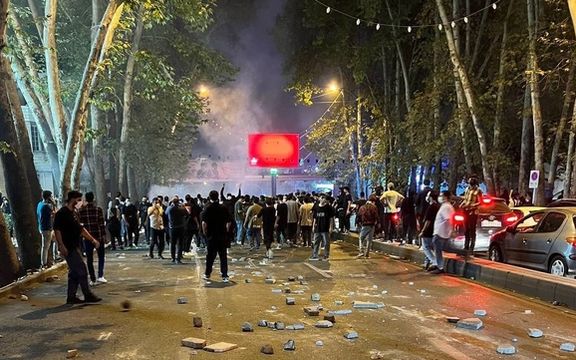
France's foreign minister said Tuesday that the European Union was looking to impose sanctions on several Iranian officials involved in the crackdown on protesters.
"France's action at heart of EU ... (is) to target those responsible for the crackdown by holding them responsible for their acts," Catherine Colonna told lawmakers in parliament, adding that the EU was looking at asset freezes and travel bans.
The bloc last agreed human rights sanctions on Tehran in 2021. No Iranians had been added to that list since 2013, however, as the bloc has shied away such measures in the hope of reviving a nuclear accord with Iran after the United States withdrew in 2018. Those talks have now stalled.
It currently has an array of sanctions on about 90 Iranian individuals which have been renewed annually every April.
Colonna suggested the new measures could target repressive regime figures who send their children to live in Western countries. Diplomats say the measures are expected to be rubber-stamped at an EU foreign ministers meeting on October 17.
The United States and Canada have already imposed sanctions on Iran's morality police over allegations of abuse of Iranian women, saying they held the unit responsible for the death of a 22-year-old Mahsa Amini in police custody.
President Joe Biden issued a statement on Mondaysaying he is “gravely concerned about reports of the intensifying violent crackdown on peaceful protestors in Iran, including students and women, who are demanding their equal rights and basic human dignity.” He added that Washington will impose more sanctions this week on certain Iranian officials.
Amini, a Kurdish woman, was arrested by the morality police in Tehran for wearing "unsuitable attire" and fell into a coma while in detention. The authorities have said they would investigate the cause of her death, but so far, no police officer has been named, held responsible or arrested.
CT scans obtained by Iran International showed that Amini received hard blows to her head causing a fracture to her skull and brain damage. Hospital staff told us that she had no hope of being revived when she was brought in on September 13. She died three days later September 16.
Her death triggered nationwide protests that quickly turned into anti-regime unrest with mostly young protesters calling for an end to the Islamic Republic, freedom for women and equality.
Iran's Supreme Leader Ali Khamenei on Monday gave his full backing to security forces confronting protests ignited by the death of Amini, comments that could herald a harsher crackdown to quell unrest more than two weeks since she died.
Protesters have been chanting “Death to Khamenei” and “Death to the dictator” ever since demonstrations began.
He blamed the United States and Israel for “planning” the protests and claimed Iranian people did not initiate the unrest. Iran often blames “enemies” for similar incidents.
Iran Human Rights, a Norway-based group, has said nearly 150 people have been killed. Iranian authorities have not given a death toll, while saying many members of the security forces have been killed by "rioters and thugs backed by foreign foes".
Around 50 people were gunned down by security forces just in the Sunni Baluch populated region of southeast Iran near Pakistan since Friday according to local sources.
With reporting by Reuters

Amid heightened restrictions on Internet access following nationwide antigovernment protests, Iranians’ use of VPNs has risen over 3,000 percent in the previous month.
"Daily demand for virtual private network (VPN) services in Iran is up over 3,000% compared to before the protests," Simon Migliano, the head of research at Top10VPN, told Axios, adding that "This is a massive spike, given that demand was already healthy before the social media shutdown."
Many countries and companies are helping Iranians get easier access to information since the authorities have increased their restrictions. The US Treasury Department has given the greenlight to SpaceX CEO Elon Musk to activate satellite Internet service Starlink for Iranians and Google has just launched a VPN service for Iranians, but using such methods are not simple enough for ordinary people and still not many have managed to access the Internet via them.
Google says its Jigsaw subsidiary's open-source Outline tool – which allows third parties to set up secure VPNs that are resistant to disruption and censorship efforts -- has seen a spike in demand from Iran this week. One such third party, Nthlink, reported that its VPN saw a massive surge in use from 40,000 users a day to nearly a million at peak and continues to see usage at ten times a typical level.
People tend to circumnavigate cyber crackdowns by downloading virtual private networks, which allows them to get around restrictions to certain blocked sites, but such tools do not work when countries shut off basic internet completely, as is the case for several regions across Iran.
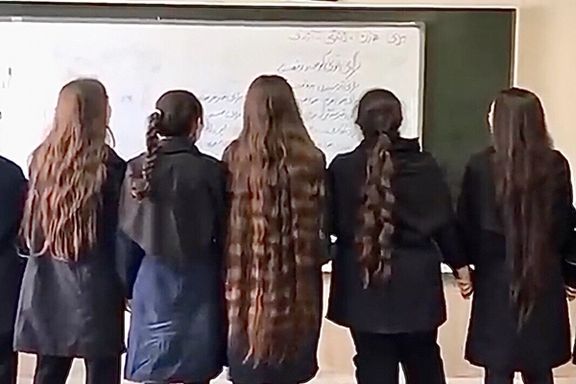
The ongoing protests in Iran have given rise to debates about the significance and implications of Iran's Generation Z that is defying rules and restrictions.
This is a generation that is also called the social media generation who were born after the year 2000, although teenagers as young as 12 now are protesting in Iran.
They are absolutely different from the previous generations in Iran. For the first time in the history of the Islamic Republic, this is a generation that has not been affected by state propaganda and enforced lifestyle. On the contrary, thanks to the Internet and satellite television, they know how other young people live elsewhere in the world and they find life under the restrictions imposed by the clerical regime humiliating.
As the current protests began more than two weeks ago, people noticed youngsters between the ages of 15-25 leading demonstrations in the streets carrying their backpacks and mostly dressed in black. They were not so afraid of Iran’s security forces as previous generations had been and were ready to break taboos.
Already, many girls and women among them walk around without hijab, while the protests started when a 22-year-old woman, Mahsa Amini was arrested by the hijab police and died in their custody with severe head injuries.
Schoolgirls without hijab driving out an education ministry official who came to convince the to "behave".
In an interview with Iran's leading economic daily Donyaye Eqtesad, Iranian sociologist and author Maghsoud Farastkhah tried to explain what is it that Iran's Generation Z wants. The interview was published on October 3, on the same day that Iran's high school and junior high school students joined the nationwide uprising.
According to Farasatkhah, to put it simply, Iran's new generation wants the right to live a normal life. However, they cannot not express their demands in the closed political system. The academic added that for the first time in Iran, the new generation's parents sympathize with them.
"Generation Z sees itself in a dystopian atmosphere," said the academic, adding that out of despair, they wish to express themselves by opting to resist the status quo even at the price of their lives. What Farasatkhah explains can be possibly best described as hopelessness. The reason why they act boldly and courageously is because they received a lot of attention by their parents and are self-confident.
This is a society suffering from inefficient governance, chaos and trauma. Everyone feels to have been victimized and overwhelmed by violence and accumulated shortcomings.
Farasatkhah further explained that the generation of the 2000s wants social freedoms, but it is not allowed to choose the lifestyle it likes. When the government imposes its own traditional lifestyle, it tends to resist, and this resistance is stronger among women because there are always more challenges for them than for men.
In a nutshell, Farasatkhah said that Generation Z has no epic to uphold and no hope for the future.
Another sociologist Taqi Azad Armaki said in an interview that Generation Z knows what it wants and it also knows that it is difficult to get it. Nonetheless, they will not become anarchists. Armaki added that Generation Z is not idealist. They simply want to live a normal life characterized by welfare, freedom and human rights. "But we have deprived them of this life. We have sent them to schools and universities, but we cannot give them a job. So, they have skills that they cannot use," Armaki explained.
The sociologist said: "We should stop calling them decadent, illiterate and morally corrupt. “These labels will prompt them to react in a radical way. We need to talk to them, but this needs to be done by intellectuals and social leaders."
Meanwhile, conservative politician and commentator Mohammad Mohajeri acknowledged that "it is difficult to deal with Generation Z." They do not care what traditions say about everything. The new generation has a different concept of freedom. On the other hand, while the previous generation got ideas from books, the new generation gets its ideas from social media. Mohajeri also pointed out that Generation Z has no leader and does not want to have leaders. They work like a tsunami and surprise the officials who have no idea about how to deal with them. Their only solution is to introduce more restrictions so that they can control the society. And this further annoys the new generation.
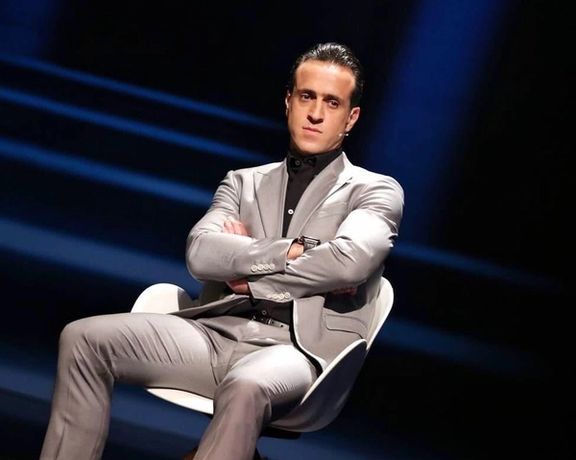
A popular Iranian former football (soccer) player has been charged in absentia for supporting ongoing antigovernment protests, Iran International has learned.
Ali Karimi who is currently abroad has been charged with unlawful “assembly and collusion with the intention of acting against national security.” This is an accusation the Islamic Republic regularly uses against dissidents and critics, with the slightest comment by an individual as grounds for a political crime.
Ali Karimi was one of the first celebrities who condemned the death of Mahsa Amini, who was killed while in the custody of Iran’s hijab police in September. Since then, Karimi has voiced support for protesters on social media becoming an icon for them. His tweets regularly generate more than 100,000 ‘likes’.
Iran International obtained the copy of a court document showing that Karimi has been charged. Although he is not in Iran, but his assets can be seized by the authorities.
Last week, security agents sealed the entrance of a villa near Tehran which was Karimi’s house, but later they removed the seal as they realized he had sold the property to someone else.
The popular protests in Iran do not have a clear leadership structure and are driven by teenagers and young people. Many celebrities who cooperate with the government to preserve their privileges in an authoritarian system, are careful not to praise the protesters. But those who side with them easily become more popular.